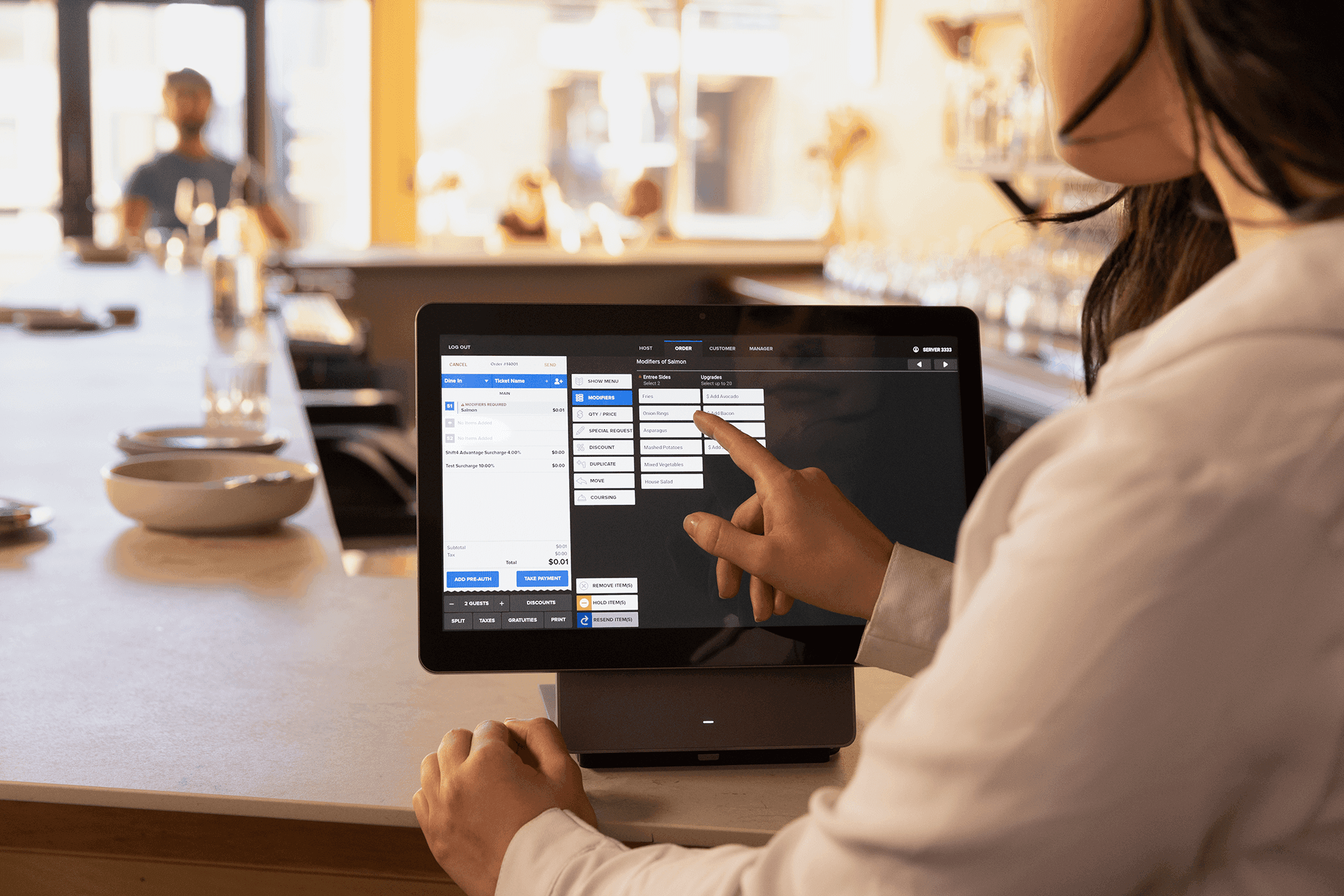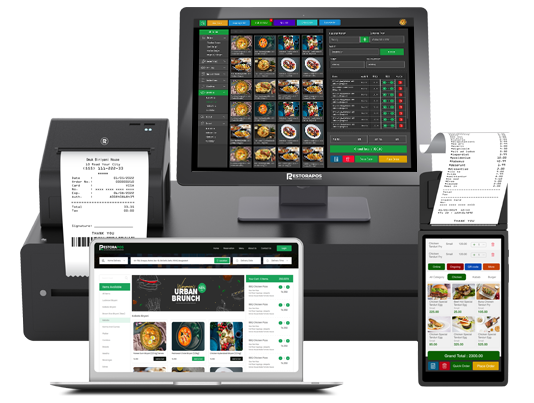Comprehending the Importance of POS Software in Modern Retail Operations
In today's retail landscape, the function of POS software has ended up being increasingly significant. These systems have actually changed from basic cash money signs up to multifaceted devices that boost different aspects of operations. They not just streamline purchases yet additionally offer insights that can shape service approaches. Understanding just how these systems influence customer experience and inventory management is necessary for any store looking for to continue to be competitive. The effects of these improvements call for further expedition.
The Advancement of POS Software: From Deal Processing to Comprehensive Solutions

Enhancing Consumer Experience With Advanced POS Features

Streamlining Inventory Administration With Integrated POS Systems
Integrated POS systems play a crucial role in streamlining supply administration by automating processes that generally called for considerable hands-on effort. These systems allow sellers to track stock degrees in genuine time, eliminating inconsistencies that often emerge from manual supply matters. With attributes such as barcode scanning and automated supply replenishment notifies, businesses can keep excellent inventory levels without overstocking or stockouts.Furthermore, incorporated POS systems help with exact forecasting by assessing historic sales data, allowing merchants to make enlightened investing in decisions. This anticipating capacity assists businesses adapt to altering consumer needs and seasonal fads more effectively.Additionally, the centralization of supply data across numerous sales networks boosts presence, making it possible for merchants to handle their stock much more successfully. Ultimately, the integration of POS systems into inventory monitoring simplifies operations, lowers human mistake, and adds to raised profitability.
Real-Time Sales Tracking and Reporting for Informed Decision-Making

Accurate stock administration prepares for effective sales monitoring and coverage. Real-time sales tracking enables retailers to keep track of sales performance as it happens, providing instant insights into consumer investing in patterns and patterns. This capacity enables services to respond swiftly to fluctuations sought after, maximizing supply degrees and decreasing overstock or stockouts.Moreover, incorporated POS systems assist in the generation of detailed records, highlighting key metrics such as sales by category, time periods, and private items. Such coverage abilities encourage retailers to make data-driven choices, determining successful approaches and locations requiring enhancement.
The Duty of POS Software in Customer Partnership Monitoring
POS software plays an essential role in boosting consumer partnership monitoring by enabling sellers to execute tailored advertising strategies. By assessing consumer data, services can tailor promotions and interactions to meet specific preferences. Furthermore, these systems help with the growth of improved commitment programs that motivate repeat service and strengthen client engagement.
Personalized Advertising Methods
As retailers significantly look for to enhance customer commitment and interaction, individualized marketing approaches have actually emerged as an important element of reliable client relationship management. POS software plays a vital duty in this procedure by collecting and assessing client information, making it possible for stores to customize marketing initiatives to private preferences and shopping habits. By leveraging understandings from purchase backgrounds, retailers can produce targeted promotions and customized interactions that resonate with clients, promoting a deeper connection. Additionally, the combination of POS software with client connection management systems enables seamless tracking of customer communications, ensuring that marketing approaches stay pertinent and timely (Restaurant POS Software). This data-driven technique not just enhances customer fulfillment yet likewise drives sales and encourages repeat business, solidifying the merchant's market placement
Improved Commitment Programs
Stores are progressively acknowledging the significance of commitment programs in fostering lasting client relationships and enhancing overall engagement. POS software plays a crucial duty in the development and monitoring of these programs, enabling merchants to track customer purchases, choices, and habits successfully. By leveraging data analytics, services can create tailored benefits and motivations that resonate with specific read what he said clients, consequently enhancing involvement in commitment programs. Additionally, POS systems allow seamless combination with mobile apps and digital platforms, helping with very easy accessibility to rewards and promotions. This not only improves customer contentment yet also drives repeat business. Inevitably, POS software equips sellers to grow deeper links with their clients, transforming periodic shoppers right into loyal clients with targeted and meaningful engagement approaches.
Integrating POS Systems With Ecommerce Platforms for Omnichannel Success
To attain real omnichannel success, seamless integration in between point-of-sale (POS) systems and ecommerce platforms is necessary. This assimilation enables merchants to unify their stock administration, making sure that item schedule is accurately mirrored across both online and physical stores. Clients gain from a cohesive buying experience, where they can conveniently switch over in between networks without running into discrepancies.Furthermore, integrated systems promote real-time information sharing, enabling companies to analyze customer behavior and preferences better. This data-driven approach enables stores to customize marketing techniques and maximize supply degrees, ultimately boosting customer complete satisfaction and driving sales.Additionally, the ability to process transactions throughout platforms streamlines operations, lowering the danger of mistakes and boosting total performance. As merchants progressively embrace omnichannel methods, the combination of POS systems with ecommerce systems stays an essential factor in achieving sustainable growth and maintaining affordable benefit in the dynamic retail landscape.
Future Patterns in POS Innovation and Their Effect On Retail Procedures
As retail procedures progress, future trends in POS modern technology are established to reshape the landscape significantly. The increase of cloud-based solutions, developments in mobile POS systems, and the benefits of AI assimilation are view website amongst the crucial developments prepared for to boost efficiency and customer experience. These improvements assure to enhance procedures and promote an extra dynamic retail setting.
Cloud-Based Solutions Surge
With the raising reliance on innovation, cloud-based POS services are transforming retail operations by providing enhanced adaptability and scalability. These systems allow sellers to accessibility real-time data from anywhere, assisting in far better decision-making and customer support. By leveraging cloud framework, businesses can decrease upfront costs connected with software and hardware installations while guaranteeing seamless updates and upkeep. In addition, cloud-based solutions support multi-location management, allowing retailers to synchronize supply and sales throughout various electrical outlets effortlessly. This versatility is essential in today's fast-paced market, where consumer preferences change swiftly. As even more stores take on these solutions, they can expect better operational performance and a more receptive method to market demands, eventually boosting consumer satisfaction and loyalty.
Mobile POS Innovations
The development of retail technology remains to form procedures, particularly with the increase of mobile POS technologies. These systems make it possible for sellers to refine purchases anywhere within the store, boosting consumer involvement and streamlining checkout procedures. Mobile POS options enhance stock administration by enabling immediate access to stock levels, aiding team aid consumers more efficiently. Furthermore, they help with customized buying experiences via integrated client information and commitment programs. As mobile phones end up being significantly advanced, stores are adopting attributes such as contactless payments and digital receipts, in addition optimizing the buying trip. The change in the direction of mobile POS not only increases operational efficiency however likewise lines up with the growing consumer preference for convenience, ensuring that stores continue to be competitive in a rapidly developing market.
AI Combination Advantages
AI combination stands for a transformative jump in POS technology, offering sellers a myriad of advantages that boost functional performance and customer experience. By leveraging equipment discovering formulas, sellers can analyze buying patterns and enhance inventory administration, minimizing waste and stockouts. Additionally, AI-powered analytics supply tailored advertising and marketing referrals, making it possible for targeted promos that increase consumer engagement and commitment. Chatbots and online assistants simplify customer service, enabling for quicker resolution of questions and boosting the overall shopping experience. Predictive analytics can additionally anticipate demand trends, enabling smarter staffing and resource appropriation. Ultimately, the integration of AI in POS systems empowers retailers to make data-driven decisions, cultivating a competitive edge in an ever-evolving retail landscape.
Often Asked Concerns
What Are the Expenses Related To Carrying Out POS Software?
The prices related to applying POS software can include software licensing costs, hardware costs, setup fees, training expenses, and continuous upkeep. Each factor adds to the total financial investment needed for an effective application.
Just How Can Little Retailers Gain From POS Systems?
Tiny sellers can benefit from POS systems through boosted deal performance, streamlined supply administration, and enhanced customer insights. These weblink systems make it possible for better decision-making, eventually resulting in increased sales and client satisfaction in open markets.
What Hardware Is Required for a POS System?
A regular POS system needs essential hardware components, including a touchscreen screen, money cabinet, barcode scanner, invoice printer, and payment terminal. These elements work together to help with effective deal handling and stock management for sellers.

Can POS Software Be Customized for Specific Retail Needs?
POS software can undoubtedly be tailored to fulfill specific retail needs. Restaurant POS Software. This flexibility allows businesses to tailor functions, interfaces, and coverage devices, enhancing functional effectiveness and giving an extra customized experience for both team and customers
Just How Protected Is Consumer Information in POS Systems?
The protection of client information in POS systems varies extensively. Numerous systems carry out security, protected gain access to controls, and normal updates, however susceptabilities can still exist, demanding ongoing caution and positive actions from stores to protect sensitive info.